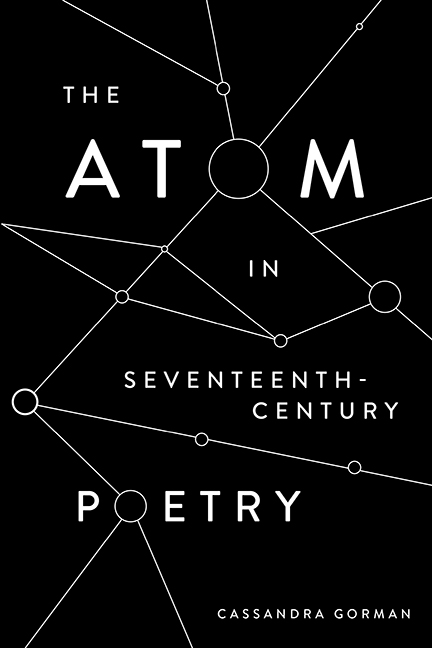Book contents
- Frontmatter
- Dedication
- Contents
- Acknowledgements
- Conventions and Abbreviations
- Introduction
- 1 Atomic Congruity: The Philosophical Poetry of Henry More
- 2 Thomas Traherne’s Atoms, Souls and Poems
- 3 World-Making and World-Breaking: The Atom Poems of Margaret Cavendish and Hester Pulter
- 4 The Atom in Genesis: Lucy Hutchinson’s Order and Disorder
- Afterword: A Poetics of the Atom
- Bibliography
- Index
- Studies in Renaissance Literature
4 - The Atom in Genesis: Lucy Hutchinson’s Order and Disorder
Published online by Cambridge University Press: 16 July 2022
- Frontmatter
- Dedication
- Contents
- Acknowledgements
- Conventions and Abbreviations
- Introduction
- 1 Atomic Congruity: The Philosophical Poetry of Henry More
- 2 Thomas Traherne’s Atoms, Souls and Poems
- 3 World-Making and World-Breaking: The Atom Poems of Margaret Cavendish and Hester Pulter
- 4 The Atom in Genesis: Lucy Hutchinson’s Order and Disorder
- Afterword: A Poetics of the Atom
- Bibliography
- Index
- Studies in Renaissance Literature
Summary
Within early modern intellectual culture, the figure of the first man and the smallest, indivisible particle of the natural world had an important factor in common: they were both first principles. Both Adam and the atom were, in their separate ways, founders of all generation and corruption that succeeded them and, for many seventeenth-century theologians and philosophers, desirable end-objects of knowledge. John Milton was certainly aware of the status held by the figure of Adam in contemporary philosophy. His depiction of the prelapsarian man responds to widespread views of Adam as first philosopher: the first principle of mankind, capable in turn of perceiving the essence of other first principles, with an innate ability to understand the true nature of things. There are two explicit references to ‘atoms’ in Paradise Lost. The first, and most well-known, occurs at the point of Satan's flight through Chaos; the second arises during a conversation between the first man and the archangel Raphael. Milton's Adam combines blessed innocence with the role of the experimental philosopher, a winning combination, commonly aspired to by seventeenth-century philosophers who longed to restore the same direct acquaintance with the origins of things. Following Raphael's account of the creation, Adam – with awe and gratitude but also with doubt, possibly sparked by the stimulus of recent conversation – replies that the angel:
largely hast allayed
The thirst I had of knowledge, and vouchsafed
This friendly condescension to relate
Things else by me unsearchable, now heard
With wonder, but delight, and, as is due,
With glory attribúted to the high
Creator; something yet of doubt remains,
Which only thy solution can resolve.
When I behold this goodly frame, this world
Of heaven and earth consisting, and compute
Their magnitudes, this earth a spot, a grain,
An atom, with the firmament compared
And all her numbered stars, that seem to roll
Spaces incomprehensible (for such
Their distance argues and their swift return
Diurnal) merely to officiate light
Round this opacous earth, this punctual spot,
One day and night; in all their vast survey
Useless besides, reasoning I oft admire,
How nature wise and frugal could commit
Such disproportions (8. 7–27)
- Type
- Chapter
- Information
- The Atom in Seventeenth-Century Literature , pp. 175 - 214Publisher: Boydell & BrewerPrint publication year: 2021



